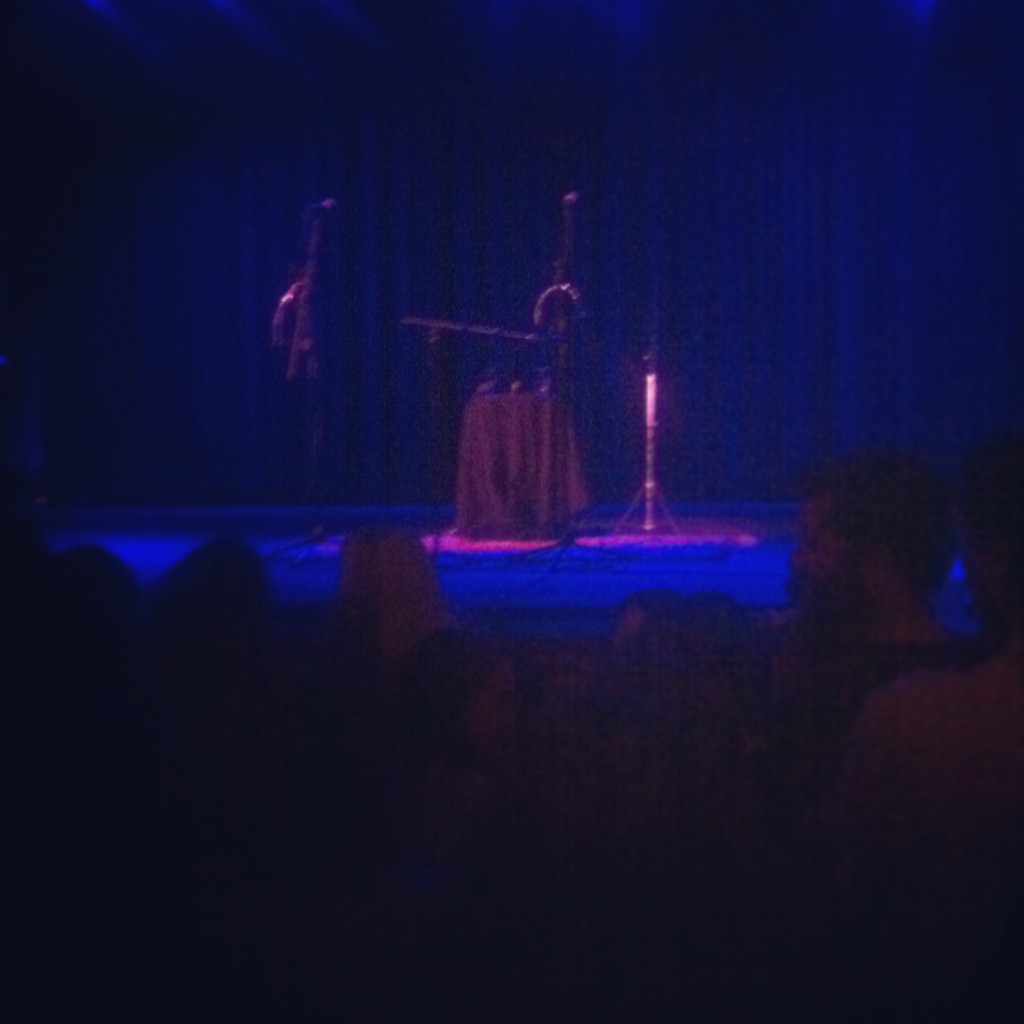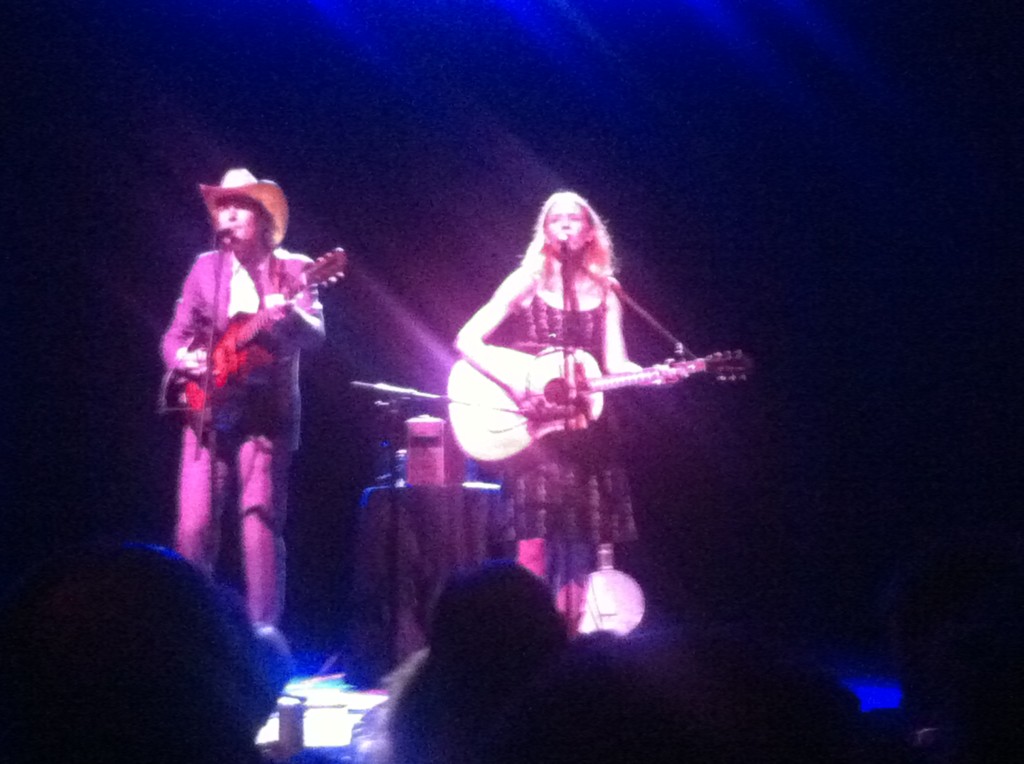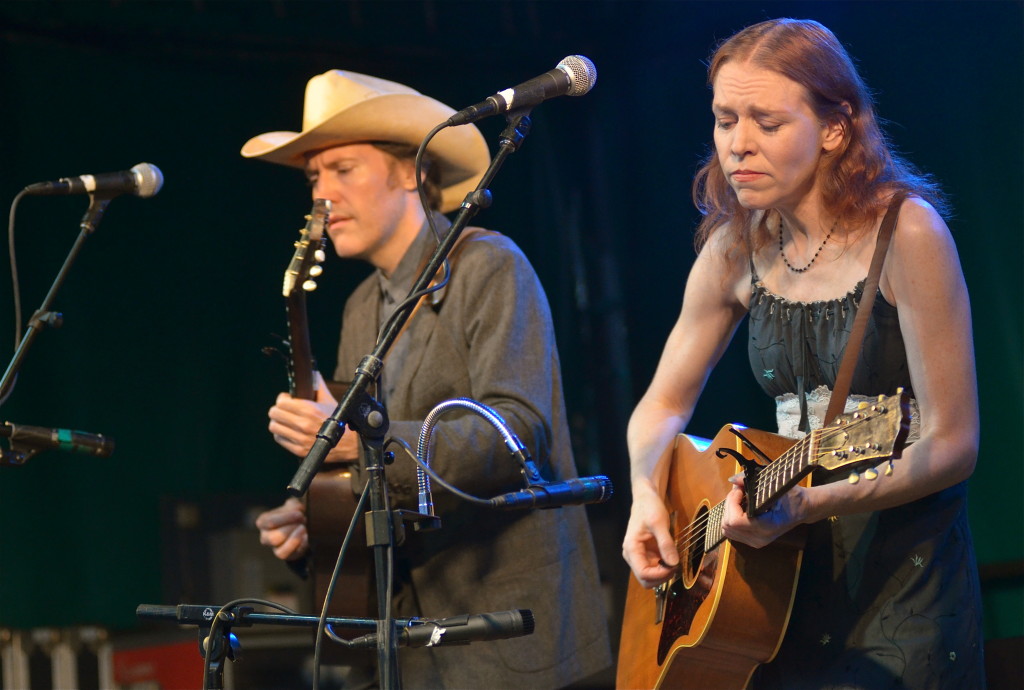Well, not completely bare. A single table draped with a black tablecloth sits center-stage. Two bottles of water await the performers. There are two microphone stands, both positioned to broadcast the acoustic instruments that will be played throughout the two hour-long sets. Beyond that, there is nothing to suggest any finery — the backdrop is a single black curtain. Various backstage elements – a step ladder, touring crates, a trash can – are visible from the edge of the audience. All of these aesthetic choices suggest a haphazard conception, yet there is intention to everything. Gillian Welch’s strength lies in the contrast between the minimalist qualities of her musical performance and the soaring strength of her rich, smoke-flavored voice. The staging only enhances this.
When she takes the stage, she carries an acoustic guitar. Neither her instruments, nor the multiple guitars played by accompanist/collaborator David Rawlins, are connected to any amplifiers. The very presence of a microphone seems a violation of the intimacy of her music. One gets the feeling that the best way to listen to the music of Gillian Welch would be to sit in a parlor room in Nashville as she and Dave play their latest offerings for family and friends. We are not at a concert — we’re at a family talent show, invited guests, and what we’re hearing is as fresh as the moment it was conceived.
Gillian’s music doesn’t really fall into any applicable category of country & western music, something she wryly points out in her stage banter. Her lyrics are too dark for country music, her music too upbeat and lyrical for bluegrass, and too twangy for folk (when she receives Grammy nominations, though, it’s as a folk artist). It falls into its own netherworld, somewhat defying description — yet at the same time there is a nostalgic familiarity to everything she sings. Some might label it ‘Americana’, an easy cop-out. It has elements of, but is something other than nostalgia — many of the songs she sings as the night goes on deal with orphans and outcasts, murders and melancholy.
The lighting of the stage consists of a dozen back lights with enough front lighting to make sure that Gillian and David are visible. The colors shift across the spectrum, depending upon the temperature of the song. “That’s The Way It Is” is lit with cold, harsh white lights that illuminate the artists as though they are angels. “The Way It Goes”, immediately following, is lit like hellfire with reds and oranges. As the lights change, Gillian’s hair turns from auburn red to blue to pink and back to red. The effect is hypnotic. Her voice floats above all, a deeper tone than one might expect of so slight a figure. There are mountains and oceans within her voice, but not soaring peaks — these are backwoods and small harbors where the outcasts of the world lick their wounds and bitterly lament the turning of their luck. The music itself is not technically perfect — there are missed notes, jarring chord changes, and occasional missteps that lend it a rustic, unfinished quality. This, however, does not affect the overall performance in the slightest. Rather, it gives a hint of the deeper truths running between the notes.
Even more hypnotic is David Rawling’s playing. In opposition to the relative stillness of Gillian, David wrings every note out of his guitar: shaking, trembling, doing everything short of breaking his guitar over his knee and pulling the music out note by note. His solos are elegant, melodic, filled with unexpected twists and turns. At the climax of “Revelator”, the title track of Gillian’s most recognized album, his virtuoso playing brings the entire concert to a halt as Thalia Hall explodes in a cacophony of sound. The hall has been recently renovated, and feels more than appropriate for the concert — it is simultaneously old & venerable and yet new & enlivened by the presence of the raucous crowd. Particularly soul-chilling is when the foot-stomping begins, bringing to mind the sound of tribal drums echoing in the dark.
Behind me, a woman sings along. She knows the words to every song. I do not have it in me to stop her. I only wish I had such familiarity with the music.
The audience at first lightly mouths along to songs, allowing Gillian to shower us with new and old songs alike. Her set list does not adhere to any specific album, rather jumping from The Harrow & The Harvest to Hell Among the Yearlings, from Soul Journey to a song from the David Rawlings Band. By the time she reaches “Look at Miss Ohio”, however, the entire crowd sings along, both old and new fans joining together in celebration of the characters of her music. She is called out for an encore, where she sings “I’ll Fly Away” from O Brother, Where Art Thou?, causing the crowd to explode. It’s a full-on revival deliriously filled with joy. We are young, and we are alive, and that is terrifying. Even after a three-song encore, the crowd is not satiated. The crowd swells in intensity until Gillian takes the stage again. After a brief moment of stammering (even she is unsure of what to do), she and David play an incendiary version of Jefferson Airplane’s “White Rabbit” before departing.
As we leave, the echoes of her cries to “feed your head” pounding in our ears, the crowd grows silent. It’s as though we’ve all borne witness to a shocking truth about the world, something just beyond voice. We’ve seen into ourselves and found darkness, but there is also light. Within the past, we can be made new again. All in two hours, to the sound of two hypnotic guitars and one smooth voice.
Gillian Welch’s current tour will continue through July 9th, making stops in St. Paul, Eau Claire, Des Moines, and Iowa City.
Editor’s note: I told him this would be worth $35. –Alex









You captured the unique artistry and intensity of this show. Stripped down and direct, warm and real, I love these guys. Thanks for your review!